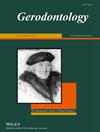Effect of Oral Screen Training After Stroke—A Randomised Controlled Trial
Abstract
Objective
To assess the effects of oral screen training in patients with dysphagia post-stroke.
Background
Oral screen training has been identified as an effective method for improving orofacial and oropharyngeal motor functions. However, the evidence supporting a positive transfer effect on swallowing capacity post-primary stroke rehabilitation is still unclear. The aim of this randomised controlled trial was to investigate the effect of a 12-week oral screen training programme using a prefabricated oral screen, with swallowing capacity as the primary outcome.
Materials and Methods
In a randomised trial, stroke survivors with residual dysphagia post-rehabilitation were randomised into intervention group (n = 12) and control group (n = 12). The intervention group underwent 12 weeks of oral screen training. The main outcome was swallowing capacity, with lip force as a training indicator. Secondary outcomes were assessed by the Eating Assessment Tool, Masticatory performance, Nordic Orofacial Test—Screening, Life Satisfaction Questionnaire and the Edmonton Symptom Assessment System.
Results
At the 3-month follow-up, the group that trained with an oral screen showed a significantly greater increase in lip force than the control group (mean lip force increase 10.2 N vs. 3.1 N; p = 0.02). There was no significant improvement in swallowing capacity (mean increase 0.7 mL/min vs. 0.8 mL/min; p = 0.43), or in any of the secondary variables in the intervention group relative to the control group.
Conclusion
The findings from this study showed that oral screen training initiated after completion of regular rehabilitation post-stroke can increase lip force. However, there was no indication of any transfer effect on swallowing capacity.
Trial Registration
Clinicaltrial.gov identifier: NCT03167892


 求助内容:
求助内容: 应助结果提醒方式:
应助结果提醒方式:


